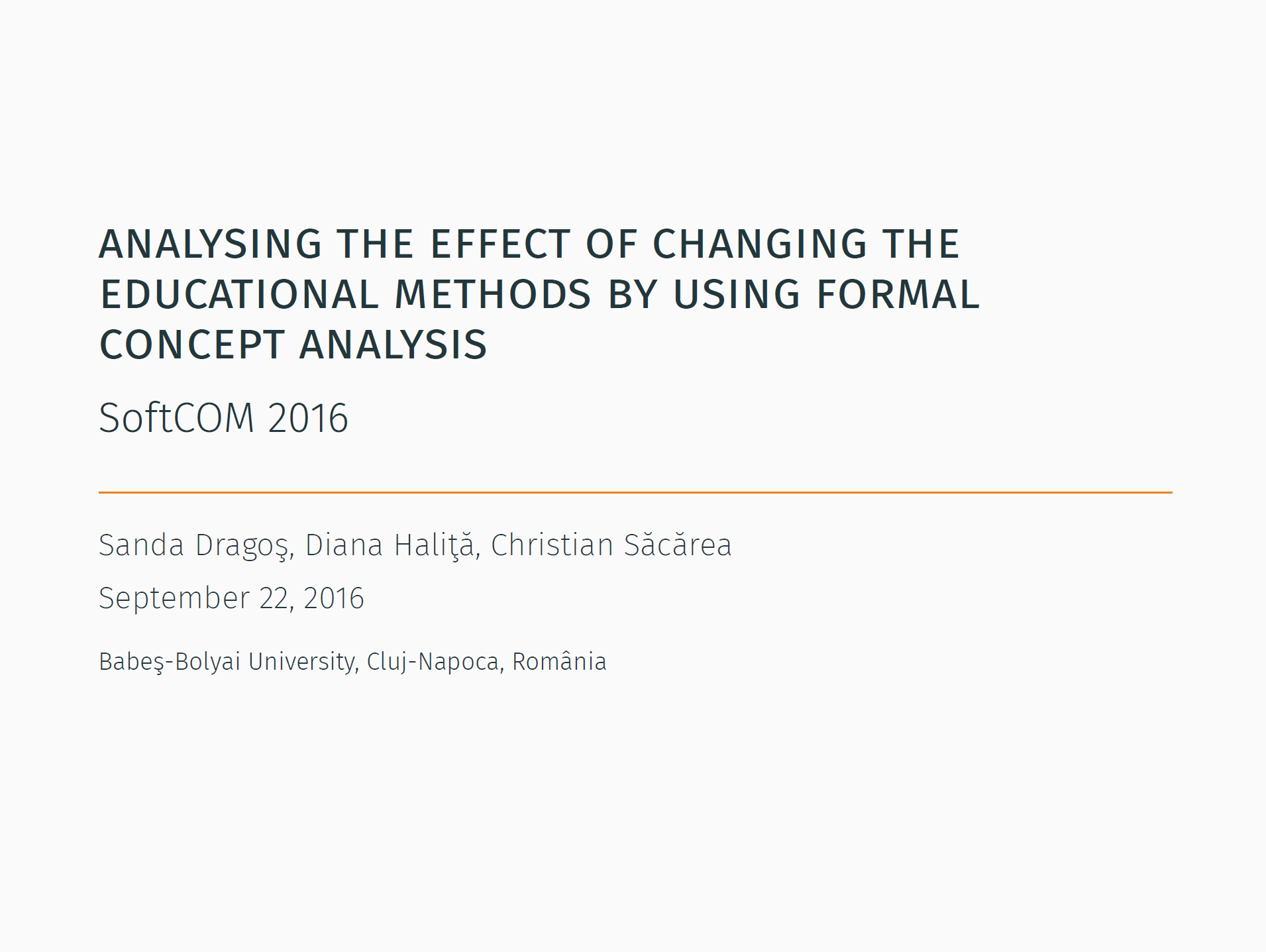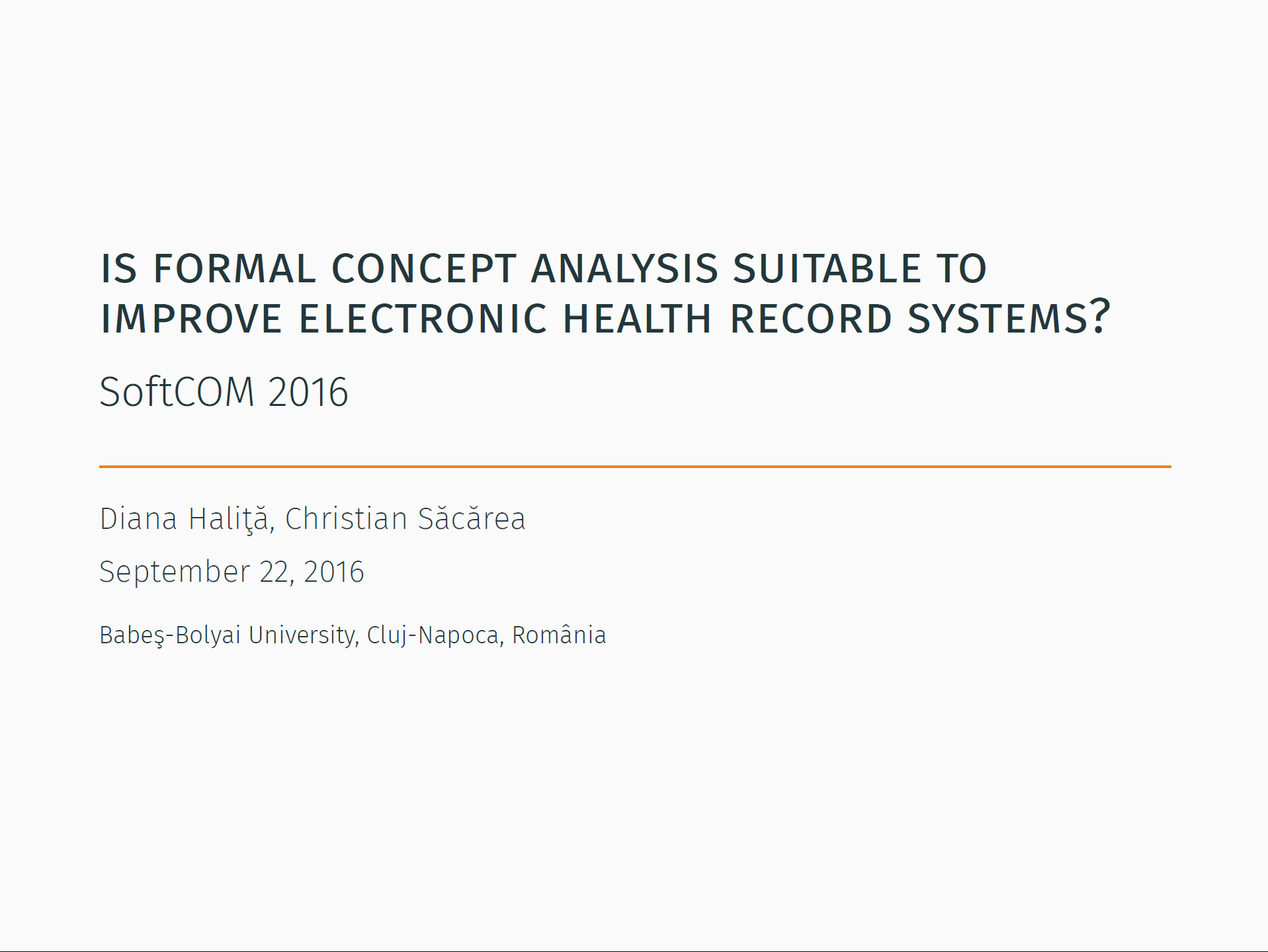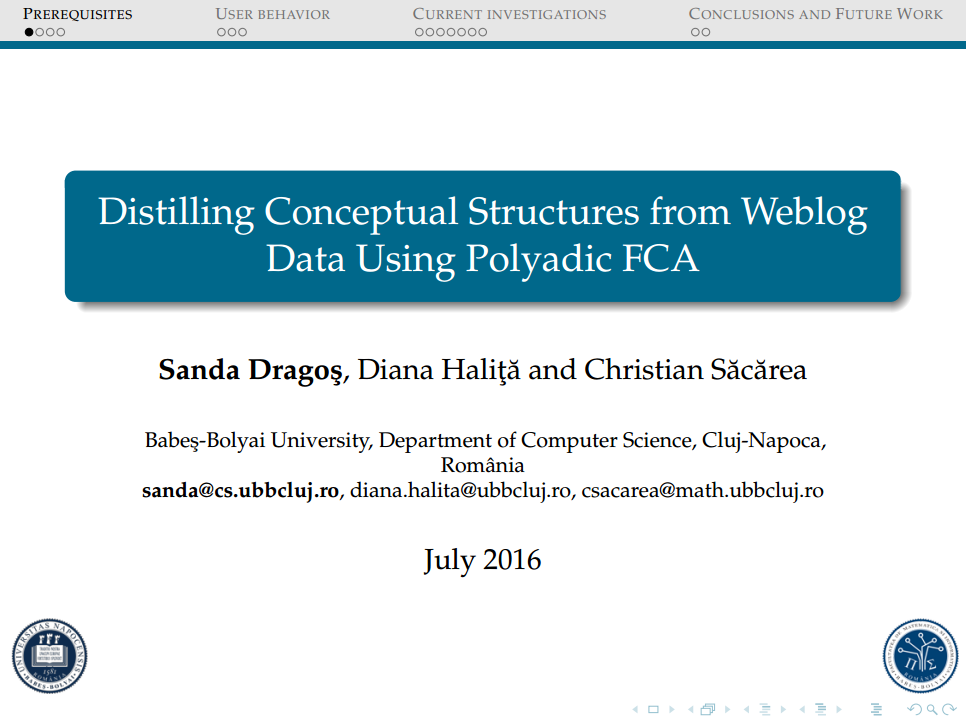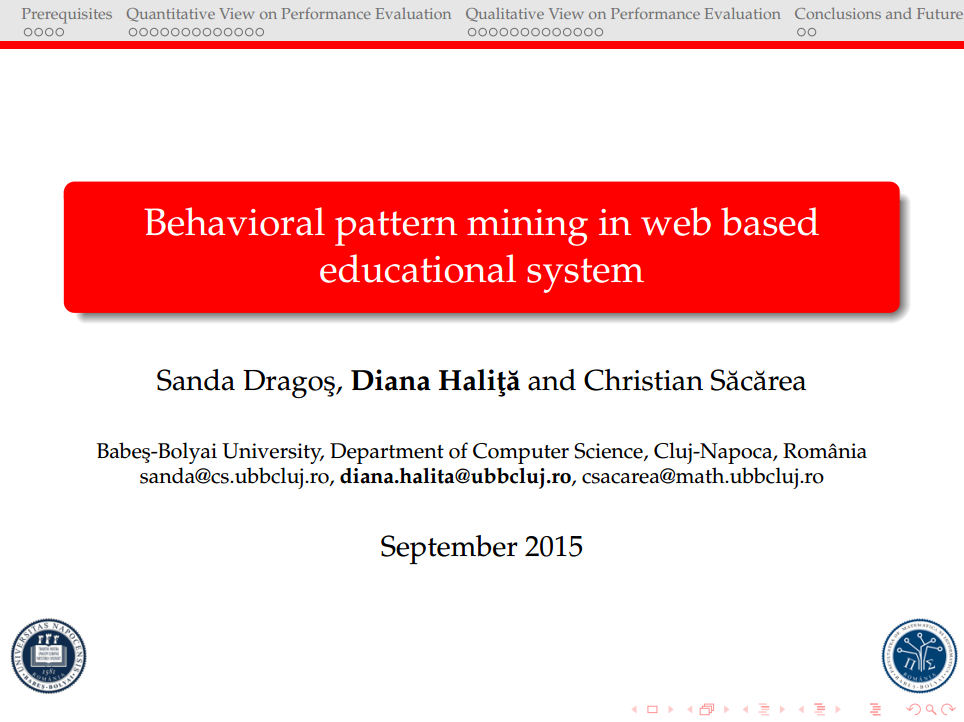Abstract:
Nowadays, online educational systems show a rapid development due to the growth of the Internet, which offer unique opportunities to improve them based on users’ experiences. This paper presents advances of a Formal Concept Analysis (FCA) based strategy for improving web-based learning sites. We have used together Web Usage Mining and Formal Concept Analysis techniques in order to create a visual overview of exploring web-logs and discover knowledge in web logs. We have focused
on visualizing triadic data in order to emphasize user dynamics through the educational systems. Switching from a triadic to a polyadic perspective we have detected repetitive browsing habits. From all the revealed behaviors we distill then users life tracks by using Temporal Concept Analysis.
Keywords:
Web usage mining, Life track, Behavioral patterns, Online e-learning environment, Temporal Concept Analysis, Formal Concept Analysis, Triadic Formal
Concept Analysis.
FCA Tools Bundle – a Tool that Enables Dyadic and Triadic Conceptual Navigation
Abstract:
Formal Concept Analysis is a prominent field of applied mathematics handling collections of knowledge - formal concepts - which are derived from some basic data types, called formal contexts by using concept forming operators. One of the strengths of FCA is the elegant, intuitive and powerful graphical representation of landscapes of knowledge as concept lattices. Nevertheless, in case of triadic FCA (3FCA) for more than 20 years there was no automatic tool for graphical representation of triconcept sets. Moreover, the triangular representation of trilattices, used so far in 3FCA has several disadvantages. Besides the lack of clarity in representation, one major disadvantage is that not every trilattice has a triangular diagram representation. In this paper we focus on the problem of locally navigating in triconcept sets and propose a tool which implements this navigation paradigm. To the best of our knowledge this is the first tool which makes navigation in larger triconcepts sets possible, by flipping through a certain collection of concept lattices.
Keywords:
FCA, Formal Concept Analysis, Context, Concepts, Dyadic Context, Triadic Context, Concept Finder, FCA Tools Bundle, Tools
Analysing the Effect of Changing the Educational Methods by Using FCA
Abstract:
Formal Concept Analysis (FCA) developed in the last 30 years to a prominent field of Knowledge Discovery, Processing and Representation. Well-known for its intuitive representation of conceptual structures as order diagrams, FCA handles conceptual hierarchies which can be derived from various data sets. This makes FCA suitable for knowledge management tasks in many fields. We consider the problem of using FCA as a quality of education evaluation tool for the instructor. Students are using educational resources in an e-learning platform and the raw data set consists only of the subsequent recorded weblogs. After a preprocessing stage, various conceptual structures - among them behavioral patterns of e-learning resources usage - are distilled from the dataset using conceptual scaling and triadic FCA and are altogether offered as a decision support for the instructor. We prove the efficiency of using FCA in comparing students behavior through the educational process and highlight how new educational strategies correlate with their academic performance and the use of online learning ressources.
Keywords:
Formal Concept Analysis, Knowledge Discovery, e-learning platform, triadic FCA, educational process
Is FCA suitable to improve Electronic Health Record Systems?
Abstract:
Formal Concept Analysis (FCA) is a prominent field of applied mathematics using formal concepts - maximal clusters of object-attribute relationships - to discover, process, and represent knowledge in so-called conceptual hierarchies. Its efficient algorithms and expressive power makes FCA suitable to unify methodologies and to provide an in-depth insight on knowledge structures [1], [2]. Electronic Health Record (EHR) systems are nowadays widespread and used in different scenarios. In this paper we consider the problem of improving EHR systems with new, FCA grounded features. For this, we start with some particular medical data sets and discuss the improvement of some features of EHR systems by using FCA. Two main methods have been taken into consideration so far. First, we consider the medical data sets as many-valued contexts. By using conceptual scaling, we build `knowledge landscapes' [3] and show how these `landscapes' might be used in the framework of EHR. A complementary approach is based on Triadic FCA (3FCA) approach. We exemplify these methods on several medical datasets and discuss how conceptual landscapes can be used to improve not only the integrated view of patient data (as an EHR system specific feature), but also communication and support future research.
Keywords:
Formal Concept Analysis, Electronic Health Record, medical data, many-valued contexts, conceptual scaling, Triadic FCA
Conceptual Navigation for Polyadic Formal Concept Analysis
Abstract:
Formal Concept Analysis (FCA) is a mathematically inspired field of knowledge representation with wide applications in knowledge discovery and decision support. Polyadic FCA is an extension of classical FCA that instead of a binary uses an n-ary incidence relation to define formal concepts, i.e. data clusters in which all elements are interrelated.
We consider a paradigm for navigating the space of concepts, based on so-called membership constraints. We present an implementation for the cases n ∈ {2, 3, 4} using an encoding into answer set programming (ASP) allowing us to exploit optimization strategies offered by ASP. For the case n = 3, we compare this implementation to a second strategy that uses exhaustive search in the concept set, which is precomputed by an existing tool. We evaluate the implementation strategies in terms of performance. Finally, we discuss the limitations of each approach and the possibility of generalizations to n-ary datasets.
Keywords:
Formal Concept Analysis, Polyadic FCA, navigating the space of concepts, membership constraints, answer set programming
Investigating Trend-setters in E-learning Systems using Polyadic Formal Concept Analysis and Answer Set Programming
Abstract:
Web-based educational systems offer unique opportunities to study how students learn and based on the analysis of the users’ behavior, to develop methods to improve the e-learning system. These opportunities are explored, in the current paper, by blending web usage mining techniques with polyadic formal concept analysis and answer set programming. In this research, we consider the problem of investigating browsing behavior by analyzing users’ behavioral patterns on a locally developed e-learning platform, called PULSE. Moreover, we investigate users’ behavior by using similarity measures of various chains of accessed pages in a tetradic and a pentadic setting. Furthermore, we present in this paper an approach for detecting repetitive behavioral patterns in order to determine trend-setters and followers.
Keywords:
Web-based educational systems, polyadic formal concept analysis, answer set programming, repetitive behavioral patterns
Distilling Conceptual Structures from Weblog Using Polyadic FCA
Abstract:
Formal Concept Analysis (FCA) is a prominent field of applied mathematics which is closely related to knowledge discovery, processing and representation. We consider the problem of distilling relevant conceptual structures from weblog data, more precisely, we investigate users’ behavioral patterns in an web based educational platform by using n-adic FCA (n=3,n=4). We focus in our research on log data gathered from e-learning platforms. Such systems are particularly interesting, since user’s behavioral patterns are closely related to their academic performance. We investigate user’s behavior by using similarity measures of various visited page chains. We exemplify the methods we have developed on a locally developed e-learning platform called PULSE. Data gathered from weblogs have been preprocessed and conceptual landscapes of knowledge have been built using FCA. Triadic FCA (3FCA) is used to investigate correlations between similar page chains and the time granule when a certain pattern occurs. Finally, we employ tetradic FCA (4FCA) to compare web usage patterns wrt. temporal development and occurence. As far as we know, this is the first attempt to use 4FCA in web usage mining.
Keywords:
Web usage mining, Behavioral patterns, Formal Concept Analysis, Similarity measures
Behavioral pattern mining in web based educational system
Abstract:
This paper presents a variety of methods that we have used and published along the years in order to investigate users behavioral patterns within e-learning systems. We have used both quantitative and qualitative methods, each offering a different level of insight. In this paper we would like to present how an investigation can benefit from using all of those methods. We start by using quantitative methods that provide us an overall perspective, from which we can focus on specific segments of data that represent points of interest on which we apply qualitative methods that provide a more detailed perspective. Therefore, we begin our evaluation by using web analytics and advance towards the state of the art concept data analysis methods, like Formal Concept Analysis. The investigation has been conducted on a locally developed e-learning platform called PULSE. However, these methods can be applied to any other e-learning platform.
Keywords:
Electronic learning, Data mining, Instruments, Navigation, Formal concept analysis, Data visualization, Force
Attractors in Web Based Educational Systems. A Conceptual Knowledge Processing Grounded Approach
Abstract:
Users behavioral patterns are one of the main research directions in web usage mining. Web based educational systems are particularly interesting since behavioral patterns are closely related to educational performance. In this paper we focus on attractors in web based educational systems, i.e., qualitative specific behavioral patterns to which users adhere over time. The research has been conducted on a locally developed e-learning platform called PULSE. Data gathered from weblogs have been preprocessed and conceptual landscapes of knowledge have been built using Formal Concept Analysis. Users behavioral patterns have been detected herefrom, or by moving ahead a triadic view. Triadic concepts enabled us to detect unstructured attractors, while conceptual hierarchies and triadic concept sets made possible to investigate the educational attractors and to derive valuable knowledge about bundle of users and their behavior related to their educational performance.
Keywords:
Web usage mining, Behavioral patterns, Formal concept analysis, Triadic formal concept analysis
Towards a Navigation Paradigm for Triadic Concepts
Abstract:
The simple formalization and the intuitive graphical representation are main reasons for the growing popularity of Formal Concept Analysis (FCA). FCA gives the user the possibility to explore the structure of data and understand correlations and implications in the data set. Recently, triadic FCA (3FCA) has become increasingly popular, but exploring triadic conceptual landscapes is not easy, especially because of the less immediate structure of the space of triadic concepts. Even more, available graphical representations of trilattices are barely intelligible and hard to obtain even for small data sets. Driven by practical requirements, we propose a new navigation paradigm for triadic conceptual landscapes based on a neighborhood notion arising from appropriately defined dyadic concept lattices. Understanding the corresponding reachability relation gives also new theoretical insights about the behavior of
triadic concepts and the corresponding triadic data sets.
Keywords:
Formal Concept Analysis, correlations, implications, triadic FCA, conceptual landscapes, reachability relation





